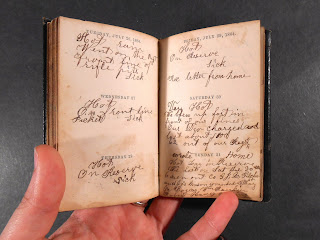 The Civil War is one of the most influential and defining moments in American history. However, in the lives of the men fighting the war, the war was a daily struggle – not just in battle, but also marching for miles, finding food and writing letters home. The diary of Henry S. Muchmore highlights the minutia that made up the everyday life of a Civil War soldier. Muchmore was an enlisted soldier in the 11th New Hampshire Volunteer Infantry, Company G. His diary entries are only a few words long describing what he did that day, the weather or important occurrences. Muchmore's diary covers January 1, 1863 to June 10, 1865, when he returned home to New Hampshire.
The Civil War is one of the most influential and defining moments in American history. However, in the lives of the men fighting the war, the war was a daily struggle – not just in battle, but also marching for miles, finding food and writing letters home. The diary of Henry S. Muchmore highlights the minutia that made up the everyday life of a Civil War soldier. Muchmore was an enlisted soldier in the 11th New Hampshire Volunteer Infantry, Company G. His diary entries are only a few words long describing what he did that day, the weather or important occurrences. Muchmore's diary covers January 1, 1863 to June 10, 1865, when he returned home to New Hampshire.Reading early entries, one almost cannot tell he is at war. On January 7th, 1864, he visits two friends in the 12th New Hampshire Regiment. On the 16th, he writes the weather is "cold as greenland." However, as he travels south, Muchmore’s diary signals the approaching battles. In June and July, he was involved in the Vicksburg campaign. A turning point in the Civil War, the Vicksburg campaign allowed General Grant to gain control of the last Confederate-controlled section of the Mississippi River. The micro-view of the operation is less grand. Muchmore grants the ripeness of blackberries and the quarts picked the same detail as the numbers killed and wounded in Jackson in mid-July. In the battles of Wilderness and Spotsylvania Court House, Muchmore had less time to pick berries. Though inconclusive battles, with heavy losses on both sides, Wilderness and Spotsylanvania were part of the Grant's final push towards victory. Muchmore is minimalist as always in these entries: he only had room to record miles marched, the number of dead or wounded and the repeated "hot." The Battle of Cold Harbor continued the trend of battle-driven entries, broken up by a few entries to record miles marched. Cold Harbor was a bloodbath for the Union, and one of the final victories of the Confederate army. Grant would go on to write in his memoirs, "I have always regretted that the last assault at Cold Harbor was ever made… No advantage whatever was gained to compensate for the heavy loss we sustained." Muchmore's diaries lack the analysis of Grant's reflections, but notes 4 killed and 17 wounded.
Due to illness, Muchmore's duties decreased in November 1864. In the year 1864, he traveled 1874 miles, wrote 34 letters and received 33. Entries from January to March 1865, primarily on chopping wood, represent a much-deserved break. Muchmore returned to capture the city of Petersburg in 1865. On April 9, 1865, he records Robert E. Lee's surrender. His next entry, on the 14th, he states "President shot." Muchmore continued serving in the military for two more months. He arrived home at 5 PM on June 10th, having been away for two years, nine months and five days.
Ask for Rauner Mss 863101.3 to see the diary.
Posted for Kate Taylor '13




